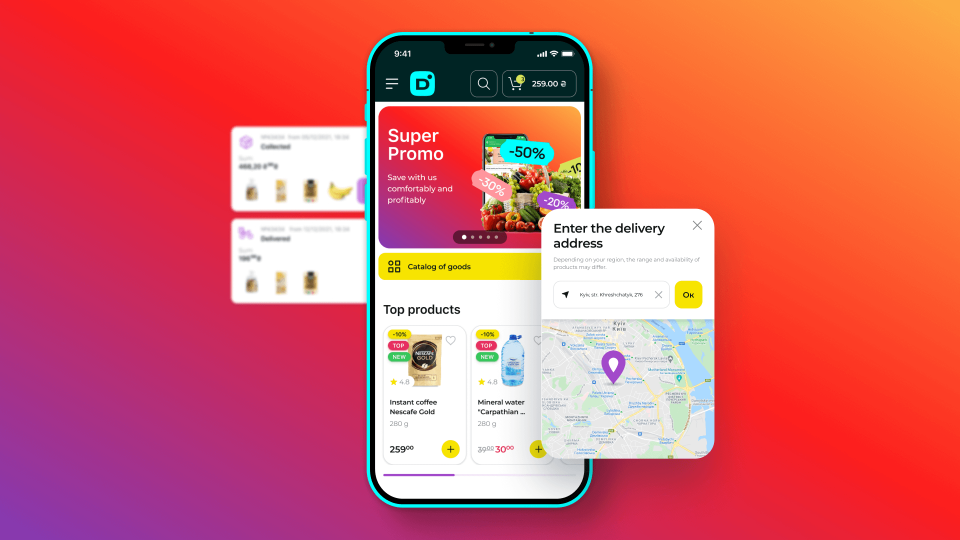The success of the entire project will undoubtedly depend on this decision. You have no chance for error. So, grab a cup of coffee, get comfortable, and let's “weigh” all the pros and cons. We promise plenty of useful information and an answer to the main question: "What will be best for your business?"
The key differences between Marketplace and eCommerce platform
It's easy. Imagine a huge shopping mall and a small, cozy shop. The shopping mall is filled with numerous vendors offering their goods, while everything in the small shop belongs to one owner. In the world of online commerce, these two concepts are called Marketplace and eCommerce, respectively.
The main difference isn't even the number of participants, but the degree of control you will have.
In shopping malls, you play by someone else's rules: the administration dictates the working conditions and discount periods. They can refuse to renew your contract or require you to adhere to a unified design code. They specify where to store goods and generally have quite a lot of power.
On the other hand, being located in a shopping mall means you don't have to independently attract potential buyers. You don't need to worry about providing security and necessary infrastructure. As for advertising and marketing (this is debatable, since you still need to compete with other vendors under the same roof).
The same applies to the online shop. Entering a Marketplace is the simplest solution. But it's not always the right one. To understand better, let's look at some other differences.
Domain and Hosting
On marketplaces, the name of your store will look something like this: https://www.amazon.com/stores/page/F50AFABA-4CDE-4A95-84D0-CA4C61819FEB
Here's an example of the Samsung homepage on Amazon. As you can see, the marketplace name takes center stage, and the brand name gets lost in a string of characters.

Is this critical for sales? No. However, you must agree that samsung.com is at least more concise and inspires more trust due to the clear understanding of where this link will lead us.
On the other hand, registering a domain name is not free. Neither is maintaining your resource on a web hosting service. We're not talking about colossal amounts, but on average, it costs about $20 - $80 per month for VPS or Cloud Hosting and can reach up to $300 for a Dedicated server.
Customization and design
A Marketplace enforces a strict design code for listings (product pages). You cannot place a button on the left if it is originally positioned on the right. You will be limited in the number of characters for descriptions and in the number of photos for visualization.

Undoubtedly, this standardization is convenient for users. They do not need to adapt to the interface of each ecommerce store, which improves the shopping experience.. However, this is not always beneficial for the brand, as it forces you to work within someone else's templates and eliminates individuality. You cannot, for example, use parallax on the first screen or beautiful animations to attract attention and demonstrate your product as a 3D model.
Visibility and SEO
Whatever you choose, eCommerce or Marketplace, you will still need to engage in Search Engine Optimization (SEO). However, despite the common goal of increasing visibility in search engines, these two models have their own specific features.
- SEO for eCommerce involves optimizing the entire website: the homepage, categories, products, blogs, and other sections. The goal is to attract organic traffic across a broad spectrum of keywords.
- SEO for Marketplaces focuses on optimizing product listings. The main task is to enhance the visibility of specific products in the marketplace search and external search engines.
Competition and marketing
Typically, competition among eCommerce resources depends on the niche and the popularity of the products. On a Marketplace, however, competition is consistently high due to the need for sellers to compete against each other on the same platform. As a result, marketing and strategic approaches vary significantly.
For eCommerce, it is important to:
- Create a Unique Brand: Develop a brand that stands out in the market
- Engage the Target Audience: Retain the target audience through useful and interesting content.
- Maintain Active Social Media Presence: Engage with customers and drive traffic through active social media activity
- Increase Repeat Sales: Boost repeat sales, for example, through personalized email campaigns.
At the same time, marketing efforts on a Marketplace will focus on different aspects:
- Optimizing Listings: Ensuring that product listings are attractive and well-optimized
- Building Customer Trust: Enhancing buyer trust through positive reviews and ratings
- Increasing Product Visibility: Using paid advertising to boost product visibility on the platform
- Offering Competitive Prices: Attracting new customers with competitive pricing
In simpler terms, eCommerce site offers more opportunities for personalization and brand management, including access to deeper analytics and a wide range of tools (which is crucial for strategic decision-making and long-term planning). On the other hand, a Marketplace provides access to a broad audience and helps reduce marketing costs.

Online Marketplace +/-
It might seem that there are too many significant drawbacks to selling on marketplaces. To bring things into balance, let's take a closer look at the advantages of choosing this business model.
Advantages
Access to a Multi-Million Audience: As of early 2024, Amazon already has over 310 million active users. While not all of them are your target audience, a certain percentage will definitely be interested in your brand's products or services. This also includes access to international markets.
High User Loyalty: Marketplaces offer numerous return options and a wide variety of products, which is an important factor for consumers. For example, a study by Jungle Scout revealed that 73% of consumers prefer shopping on Amazon and eBay due to convenience and fast delivery.
Simplified Logistics: Many marketplaces offer warehousing and delivery services, allowing you to focus on your business rather than basic operational tasks.
Quick Start: Registering and starting sales on a marketplace takes significantly less time compared to creating and launching your own E-Commerce project.
Disadvantages
Commissions: Yes, the initial investment required to start on a marketplace is significantly lower compared to the costs of creating and maintaining your own eCommerce website. However, the revenue you earn from sales on your own platform belongs 100% to you. On a marketplace, you are charged listing fees, a commission on each sale, and potentially additional costs depending on the platform.
Dependency: As mentioned, the level of control is low. Marketplaces can change their “rules of the game” at any time, introduce new policies and rules that might be completely unacceptable for your brand.
Limitations: In terms of design, functionality, payment methods, etc. Selling on an online marketplace is limited to a quite basic set of tools, which might be insufficient for implementing complex business processes. Additionally, there are often restrictions on customer interaction. Frequently, brands do not have opportunities for direct communication and building long-term loyal relationships. This can lead to reduced virality, lower repeat purchase rates, and a lower average order value.
Who Is It Suitable For?
When choosing between an eCommerce platform vs Marketplace, we would recommend opting for the latter if:
- your resources are limited: if you have constrained resources and are not ready to invest in developing your own eCommerce project.
- if you want to quickly enter the market and leverage an existing audience.
- if you need to test new approaches, hypotheses, and concepts.
- you have a limited range of products.
In other words, this is an optimal solution for small businesses without extensive strategic plans.
Alternative solution
When we remember the marketplace business, we often immediately think of Amazon, eBay, AliExpress, and sometimes Walmart or Rakuten. We typically view ourselves as a regular seller on these platforms. But what if you were the owner of a marketplace?

For example, consider a Dark Store. This is a warehouse or store without a physical sales floor, focused exclusively on online sales. It’s an ideal format for:
- Retail Chains: Allows expansion into new geographic areas and speeds up delivery in densely populated regions.
- Food Manufacturers: Helps improve customer service, automate processes, and reduce costs.
To understand how this works in practice, what advantages you might gain, and how WEZOM’s team managed to double the company’s profit, read the Case Study of Darkstore:
E-Commerce platform +/-
The key advantage of E-Commerce solutions remains personalization in all its forms.
83% of consumers aged 35 to 54 are more likely to make purchases from brands that offer personalized recommendations based on their previous searches.
As you can see, achieving such a level of personalization using the tools provided by major marketplaces is almost impossible. In fact, many platforms don't even allow you to send direct emails to customers.
Advantages
Building a Strong Brand: This is an investment in the future. It helps you stand out among competitors and become memorable to consumers.
Unique User Experience: Creating personalized shopping paths not only attracts new customers but also retains existing ones. This enhances their loyalty and satisfaction.
For example, look at Samsung's eCommerce, it's a custom development that definitely creates a unique experience:

Control Over Pricing: Not only due to the absence of marketplace commissions. In your own space, you are not obligated to engage in price wars or lower prices due to high competition. You decide when to offer discounts and run promotions.
Flexibility in Marketing: Implement any bold and innovative strategies. You’ll have access to deeper tools for SEO, content, and email marketing. Together, these capabilities allow for a fundamentally different approach to engaging with your target audience.
For instance, if you plan to introduce unique loyalty and reward programs for regular customers, marketplaces typically do not offer this capability.
Adaptation to Business Needs: Starting with basic features, such as product configuration options. On platforms like Amazon, you cannot implement additional option choices or tailor the purchase to individual customer preferences (e.g., color, size, functionality).
If you are ready to accept unconventional payment methods, such as cryptocurrency, can a marketplace accommodate that? The answer is clear.
Additionally, if you need integration with internal Enterprise Resource Planning (ERP) systems or Customer Relationship Management (CRM) systems, or if you’re considering implementing an AI-powered chat feature, a marketplace usually would not support these requirements.
There’s no need to continue. It’s clear that only an E-Commerce solution allows you to fully control your business, build a unique brand, and implement customized business solutions.
Another important but less obvious advantage
There are products that are extremely difficult to sell on marketplaces. This brings to mind a case with one of our clients—a firearms retailer and a flagship of Ukrainian shooting culture.

Popular Marketplaces may have very strict restrictions in this niche. They do not promote such products and are extremely reluctant to drive traffic to these listings. However, this was not the key reason why Gun shop STVOL required a custom development.
Learn more details in the case study. We would like to highlight that the well-chosen solution allowed to:
- Attract a younger audience;
- Increase sales figures by more than 30%;
- Raise the average order value.
In our opinion, the flexible filter system and the thoughtfully designed catalog structure were implemented particularly successfully.
Disadvantages
Cost and Development Time: It’s simple. Any exclusive solutions, whether it’s a Rolex with personalized engraving, a Tesla Model S with a custom configuration, or an eCommerce platform with unique functionality, are not created quickly.
Self-Traffic Generation: Unlike digital marketplaces, where visitors are essentially “served on a plate,” owners of eCommerce platforms must handle SEO, contextual, and targeted advertising themselves.
Resource Requirements for Maintenance: Regular software updates, protection against cyberattacks, and ensuring uninterrupted operation require either hiring a new in-house specialist or outsourcing these tasks (which also incurs additional costs).
Who Is It Suitable For?
E-Commerce solutions have no restrictions on products or niches. However, the need for custom platforms becomes particularly evident if:
- you are a luxury brand in your segment with unique marketing strategies;
- you sell products online that require complex configurators, personalization, or specialized demonstrations;
- you operate on a subscription model;
- you need a platform with a high degree of customization for any other reason.
It is also worth noting that standardized marketplace tools are definitely NOT suitable for B2B (Business-to-Business) companies. If you need to manage orders, inventory, and customer data while integrating with an ERP system, an eCommerce platform is not only the best but the only choice.
So what option will be better for your business?
If you have any questions or concerns after reading the article, please contact our manager for a more detailed consultation.
- We will select the best development option based on your request and business goals;
- We will consider your budget preferences and honestly inform you about any potential pitfalls;
- We will offer modern, unique solutions, including the implementation of artificial intelligence and machine learning.
With us, you will not only make a strategically important decision but also learn how to implement it with minimal risks and maximum efficiency.


